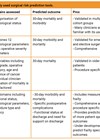This large-scale retrospective study evaluated the short-term postoperative outcomes in patients with localised prostate cancer treated with radical prostatectomy (RP). Both body mass index (BMI) and Charlson comorbidity Index (CCI) are well established indicators of adverse outcomes post major surgery, however frailty is yet to be properly explored. Frailty is defined as a state of health described by reduced physical reserve, increased vulnerability to stressors and accounts of cognitive, functional and social impairments. In this study, frailty was measured according to the John Hopkins ACG frailty-defining diagnosis indicator, which utilises 10 defining diagnosis such as dementia, malnutrition and social support needs. This was identified using ICD-9 codes on the National Inpatient Sample database containing approximately 92,000 RP cases. The interesting results of this study were that every seventh RP patient was identified as frail and that there was very small overlap between classical indicators suggested to determine ‘fitness’ for surgery. For example, only 1.2% and 0.5% of all RP patients were frail and obese or CCI>2, respectively. These observations demonstrate that frailty can be qualified as a distinct and unrelated metric to above aforementioned factors. Secondly, frail individuals demonstrated higher odds of overall complications on multivariate analysis after adjusting for confounders such as age, ethnicity and income (OR = 1.95 [95% CI 1.84-2.06]), length of stay (OR = 1.19 [1.15-1.21])16.6 vs. 8.6%). Despite the limitations of the study, such as handling of missing data, not being able to adjust for ICD-9 codes assigned to patients prior or during admission, the study clearly highlights that frail individuals are at higher risk of adverse short-term postoperative outcomes that cannot be predicted by other factors such as obesity and comorbidities. This is an important assessment to make at clinic, and strengthens the argument to use the Comprehensive Geriatric Assessment Toolkit, especially before offering this cohort of patients surgical intervention.






